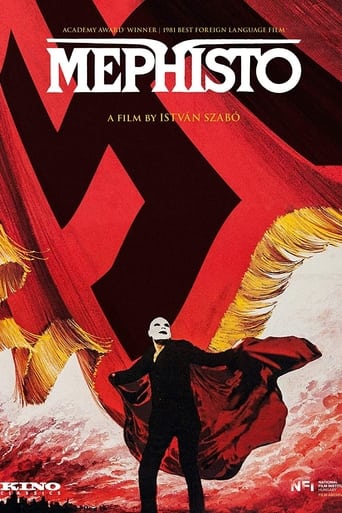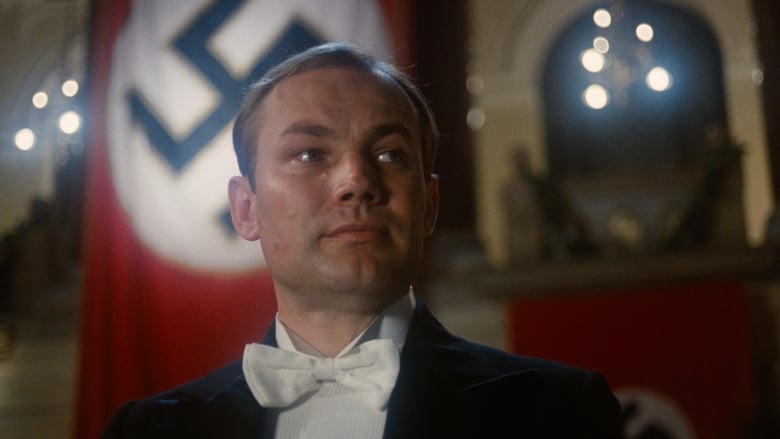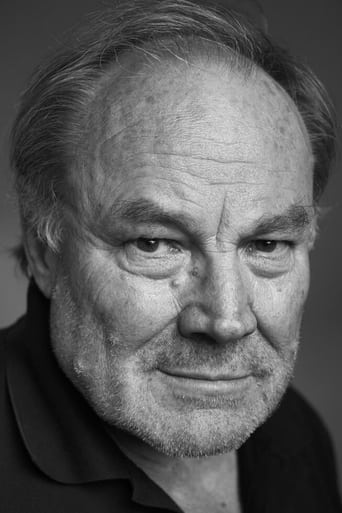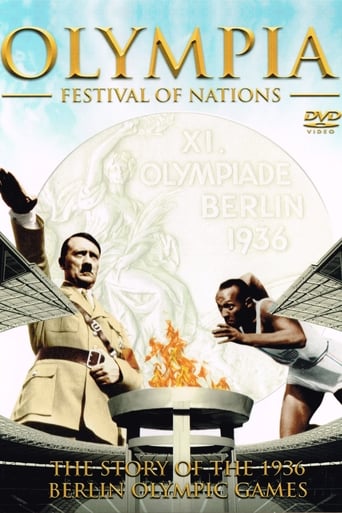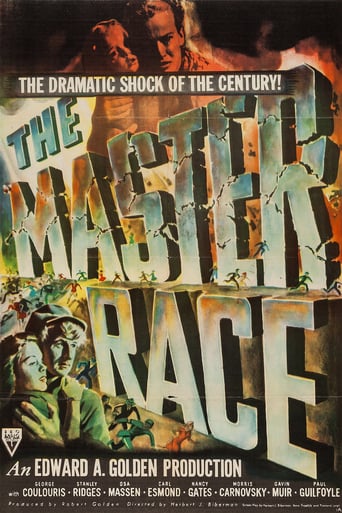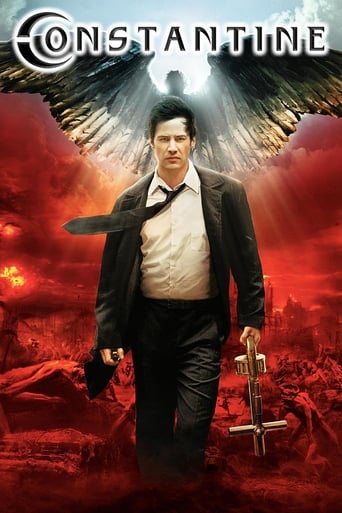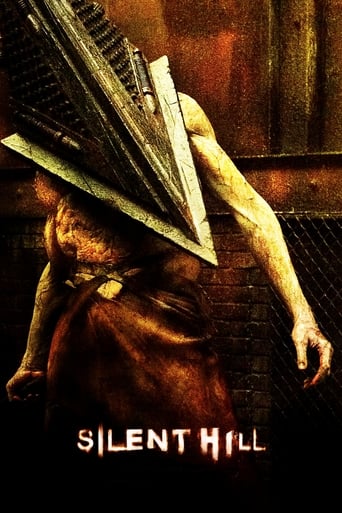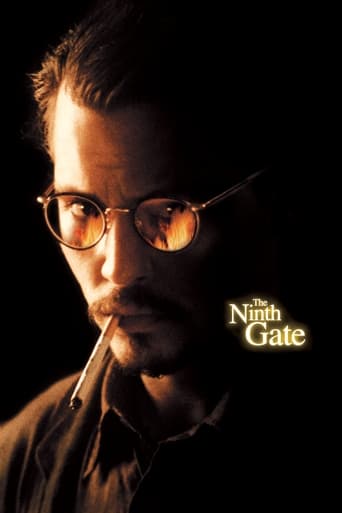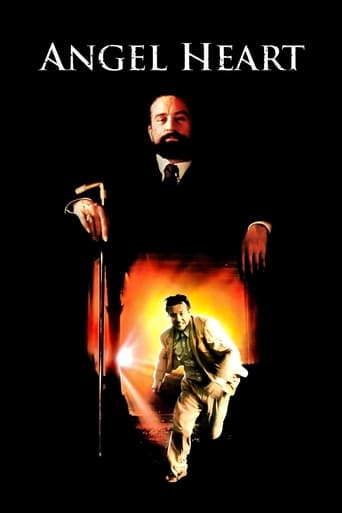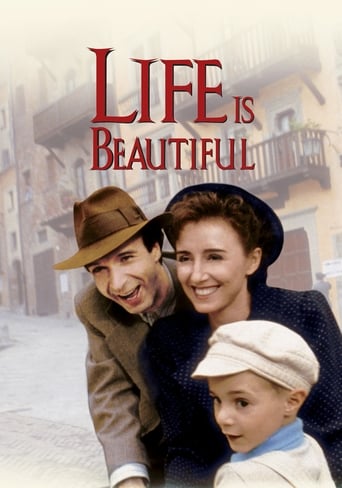Mephisto (1981)
A German stage actor finds unexpected success and mixed blessings in the popularity of his performance in a Faustian play as the Nazis take power in pre-WWII Germany. As his associates and friends flee or are ground under by the Nazi terror, the popularity of his character supercedes his own existence until he finds that his best performance is keeping up appearances for his Nazi patrons.
Watch Trailer
Free Trial Channels
Cast


Similar titles
Reviews
Wonderfully offbeat film!
a film so unique, intoxicating and bizarre that it not only demands another viewing, but is also forgivable as a satirical comedy where the jokes eventually take the back seat.
If you like to be scared, if you like to laugh, and if you like to learn a thing or two at the movies, this absolutely cannot be missed.
It is an exhilarating, distressing, funny and profound film, with one of the more memorable film scores in years,
István Szabó's movie is based on the novel with the same title by Klaus Mann, the son of Thomas Mann. There is, however, an essential difference between the treatment in the book and in the movie of the same material: the character and behavior of the actor Gustaf Gründgens, the (ex-) husband of Klaus' sister Erika. Gustaf Gründgens had only one obsession: acting, to become the best actor and that at all costs. For the literary critic M. Reich- Ranicki, Gustaf Gründgens was indeed the best German actor of the 20th century. He excelled in the role of Mephistopheles in Goethe's Faust (see the movie 'Faust' shot by his adopted son Peter Gorski – one caveat: no subtitles).The novel and the movie Klaus Mann's novel is basically a sharply defined portrait (and an attack on) of his brother-in-law, the overambitious theater man. In order to fulfill his ambitions, G. Gründgens plays the role of the humble collaborator/servant of all those in power, be they from the left or from the (extreme) right, so also of the Nazis. But, the movie goes one step further. The actor, Gustaf Gründgens, serves as a means to dissect a cardinal human problem: the relationship between art and power (politics). The movie illustrates eminently that an artist (art) should not play the role of an innocent human being in a society full of bloodshed. As André Gide said, 'there is no art without liberty'. An artist (actor) should not collaborate naively with culture barbarians ('When I hear the word culture, I reach for my revolver'). In any case, for those culture barbarians artists (actors) should only play the part of their negligible foot soldiers, which can be 'crushed like beetles' ('Get out, actor!'). Klaus Maria Brandauer plays perfectly the 'two' Mephistopheles, the 'immoral' character in Goethe's Faust and the 'innocent' political collaborator. He is surrounded by a splendidly directed great cast. This movie, which tackles head on the role of art (movies) itself, is a must see for all lovers of world cinema.
Klaus Maria Brandauer is Hendrik Hofgen, an actor in Hamburg at a local theater. He gets noticed when he moves to the big time in Berlin. It is the 1930s, and Hitler and the Nazis have just come to power. He must make choices which become a Faustian bargain, as the saying goes. One fellow actor is taken away and shot, and he is told that his friend died in a car accident, and another dies in a convenient suicide. As the world changes rapidly around him, Hendrik learns to play the game and adapt to the new regime. He repeatedly claims to only be an artist, without any interest in politics, however, he has to bow down to the new prime minister, who just so happens to also be a general. He is made the director of a theater and told to produce plays with positive German heritage, and no more French farces, or other inferior foreign material. He does sell out and he is rewarded with a comfortable lifestyle. Brandauer is tremendous, and in just about every scene. The matter of fact acceptance by most of the people to the new Nazi regime is subtle and terrifying. Mephisto is dark and frightening.
Much is said of Brandauer's performance here and it is an actor's performance par excellence: look at me, look at me, I am so good, and don't turn away, look at me again. In this respect he is like Robin Williams in one his manic performances which also craves attention and while Brandauer is a brilliant stage performer - the scenes of him on stage are amongst the best in the whole film - his stage-bound acting style in most of the rest of the film is like some psychopath with ADD.This gives the film problems because it fails to build empathy with his ordinary situation: how to deal with an evil government and have a conscience. This problem is compounded by the close up camera: we are always looking at his face in some unendurable clinch as he tries to kiss us and ask us how good he is again and again.The other weakness is the long build to the story. The film takes 40 minutes to become interesting; the preamble is just Brandauer's character being selfish and self-absorbed.
Emotional, furious, frustrated, pretty straightforward, concerned about perfection, so vital on rehearsals...Hendrik Hoefgen, an actor who is found to have an interesting head to be sculpted, a man with his desires and ambitions, an artist who experiences a strange way from Hamburg to Berlin of the 1930s. What does he have to learn on this journey to the great capital and a great career? Some say compromise, others humiliation. If the latter exaggerate, it's going to be the compromise that will lead to something Hendrik would probably never want nor expect...MEPHISTO directed by Istvan Szabo is a movie based on true events from the life of Gustav Grundgens (1899-1963) and based on the novel by Klaus Mann. Therefore, we could say that it is partly a biopic. Yet, this view would lead to confusion and misinterpretation. MEPHISTO is foremost a film about a life in a particular situation, about decisions one has to make, about burden one has to carry, about misunderstanding one has to prepare for and about treason one has to cope with. Hendrik Hoefgen (Klaus Maria Brandauer) appears to be a very complicated person: he wants to do something powerful yet, he is haunted by insecurity and fear that lie within his four walls of the psyche. As a result, he wears a "symbolic mask" among people. The role of his life is Mephisto which he portrays twice. However, he does not expect that this second time, in order the portrayal to be accepted, he will have to adjust it. Moreover, what he never foresees is that he will also have to adjust his entire life and career in order to exist. The moment that presents his character in a nutshell is the meeting in the theater with Nazi Prime Minister Hermann Goering (Rolf Hoppe) - his behavior changing from insecurity and soft handshake so despised by the new leaders to cold smile and obedience. Then, they will start to "like" him, then, they will call him Mephisto (our "Mephisto"). But is that the only way to popularity?...But the development of the main character, which is close to masterwork, is not all MEPHISTO offers. It's a movie about a particular reality (presumably a political content) that Germany was exposed to in the 1930s, the reality that never leaves you indifferent. It is a movie that provokes emotional thoughts in any viewer ready to reflect. A pack of fanatical men rule, force a "code of proper beliefs and behavior" and...what to do to survive? Either immigrate or adjust oneself to this reality. Those who reject a new vision of Germany (e.g. Hans Miklas or Otto Ulrichs) experience the worst (of course, communism was another evil of the time); those who immigrate (Hendrik's wife Barbara) are regarded traitors; yet, those who stay and parrot the "pseudoclassic slogans" are, for the time being, used for certain purposes. Yet, not all people can choose...In this case, a very interesting, though upsetting, facet of the problem is developed: racism. Hendrik's mistress Juliette Martens (Karin Boyd) is black, she wants to have a baby. However, the career of the actor and the director of Berlin theater would come to an end. He cannot dare for love with a black woman. In a memorable scene, she asks him desperately: "What guilt is there to blame on a child born of black mother and white, famous, father?" Then, as he immediately puts aside this question, she shows him an old photo from his childhood in which Hendrik stands upright in his most young, fresh, pure years. Juliette looks at him in despair and says: "Do you still recognize yourself?" I'll leave this thought to you who read... You must see this scene, a little psychological pearl!The performances are terrific. Klaus Maria Brandauer portrays his part in a very powerful way. You see an actor playing an actor, a mask among people, an actor in his roles, an actor in his life, a person who once appreciated freedom; yet, in time, asks himself "Freedom? What for?" It occurs that the Nazi dominate his life already. I think that if you like Mr Brandauer as an artist, you would definitely regard this role as one of the best ones except for Redl (1985) and Nebuchadnezzar (1998). I am proud to say that Krystyna Janda, a Polish actress, is in this film. Although I don't list her as one of my favorite actresses, I have to admit that she very well fits to the role of Barbara Bruckner, Hendrick's wife. In a memorable conversation in Paris, she does a very fine job showing helplessness, rejection and disgust to what happens in Berlin. The third role absolutely worth consideration is Rolf Hoppe's Hermann Goering - he portrays a real Nazi whose behavior is supported by three pillars of the ideology: POWER, ABSOLUTE PRIDE and INFLEXIBILITY. As for purely technical aspects, the movie does not boast much. The picture is rather pale and the camera job is also not very outstanding. Yet, Sztabo's film is primarily meant to win by its content, to leave something psychologically precious in the viewers, appears to be more for the MIND than for the EYES. Therefore, this weaker cinematography may be forgiven for the sake of flawless aspects galore.MEPHISTO, though a sad and rather a depressing movie, is a must see for people who appreciate thoughts, who want to get something from a film. Perhaps not that historical to the letter but a pretty nice insight into a complexity that human appears to be. But see it in spring or summer rather than long, dark and upsetting autumn evenings.

